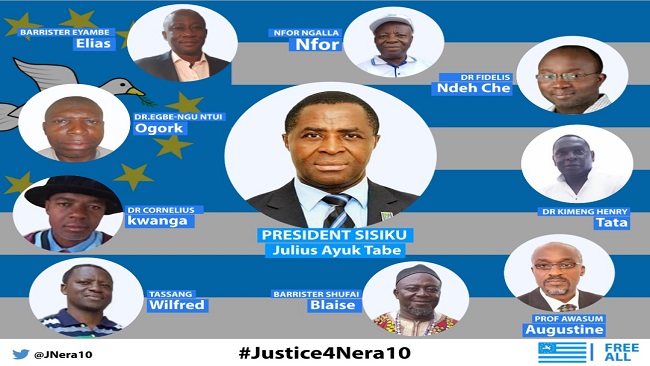Nera 10: Biya’s selective amnesty dashes hopes of lecturers’ release
Observers of Cameroonian politics and higher education are baffled and disappointed by President Paul Biya’s decision not to include the six university teachers abducted from Abuja, Nigeria, and deported back to Cameroon in 2018 in his recently-granted amnesty for political prisoners.
Biya’s general amnesty announced in early October saw the unconditional release of 333 political prisoners, including Maurice Kamto, a professor of public law and former dean of the faculty of law at the University of Yaoundé and later faculty of law at the University of Ngaoundéré. He was jailed in January 2019 along with about 200 of his supporters because he contested last year’s presidential elections and claimed to have won.
Academics in the faculty of law at the University of Nice in France, where Kamto is an alumnus, and others at the Sorbonne and in Yaoundé universities as well as influential international jurists mounted pressure on both the French and Cameroonian governments to effect the unconditional release of Kamto.
“High profile colleagues in law circles both in Cameroon and France had to mount a lot of pressure on Paul Biya that he should use the opportunity of the flexible amnesty umbrella to free Maurice Kamto,” a professor of international relations at the University of Yaoundé who requested anonymity told University World News.
National dialogue
The amnesty came after Biya’s “National Dialogue Conference” which started on the last day of September and which brought together representatives of political parties and members of civil society organisations to discuss the demands emanating from the English-speaking part of the country for a return to the 1961 Constitution which guarantees federalism and equality between English- and the French-speaking regions.
It is this same protracted conflict that led to the detention of the forementioned academics in a hotel in Abuja, Nigeria, where they had apparently gathered to discuss the humanitarian situation facing Anglophone Cameroonian refugees in Nigeria.
Among those deported was Dr Sisiku Julius Ayuk Tabe of the American University of Nigeria in Yola, who is reportedly the first self-proclaimed president of ‘Ambazonia’, a breakaway state declared in October 2017 in two English-speaking regions of Cameroon.
The academics were among 47 separatists arrested at the same time. They were deported to Yaoundé where they were tried by a military tribunal, despite their civilian status, and sentenced to life imprisonment. The move prompted a flurry of appeals from within Cameroon and abroad.
Hopes for the release of the academics were high after National Dialogue participants recommended to Biya that all political prisoners should be unconditionally pardoned and released under the amnesty to allow wounds to heal.
Reasons for exclusion
In an exclusive interview via WhatsApp from Yaoundé, Barrister Shufai Blaise, the legal counsel for the university teachers, explained what he believed were the technical reasons for the government’s exclusion of the teachers from the amnesty.
“Those released from detention were either awaiting trial or their matters are pending in court. Thus President Paul Biya’s amnesty decree is a type of ‘nolle prosequi’ – in other words an order to stop further prosecution. Most of those released, if not all, were being prosecuted for misdemeanours,” he told University World News.
“These university teachers were tried and sentenced. This places them as a very special case. The president, if he so wishes, may make a separate and distinct amnesty order to release them. However, those five lecturers are considered what I called important bargaining chips for future negotiations. President Paul Biya is not in a hurry to release them now. They would be relevant in future negotiations,” he said.
Blaise described the academics as core members of a bigger political organisation fighting for, at the very least, the revival of the 1961 Constitution whose principles are those of federalism and equal rights between Anglophone and Francophone Cameroon.
He said there was enormous pressure from international organisations not only to release the lecturers but also to get the two parties to the negotiating table with a view to finding a permanent solution to the crisis.
Fear and uncertainty on campuses
Meanwhile, the continued detention of the academics has created an atmosphere of uncertainty and fear at the two Anglophone universities in Cameroon. At the universities of Buea and Bamenda there is a palpable air of fear developing because of the presence of security agents on the two campuses.
“Many of the university teachers in these two universities have taken refuge in Nigerian universities near the border where they have compassionate colleagues. Many Anglophone Cameroonian students have sat for admission examinations into Nigerian universities because of disruption of academic programmes in these two Anglophone universities in Cameroon,” said Dr Johnson Akpan, a physics lecturer who fled the University of Bamenda and is now resident in Calabar, a university town in neighbouring Nigeria.
The National Executive Council of the Academic Staff Union of Universities (ASUU) in Nigeria is considering a petition to the African Commission on Human and People’s Rights on the unlawful abduction from Nigeria of the university teachers.
The union is also planning to protest to the African Union the refusal of the Cameroonian government to obey a court order issued by a Nigerian court demanding the return of those abducted lecturers back to Nigeria.
Culled from University World News





